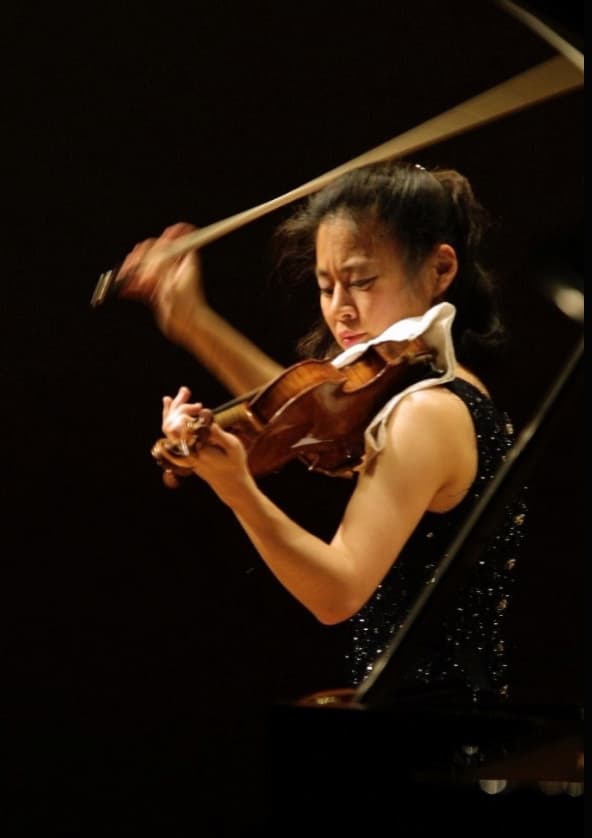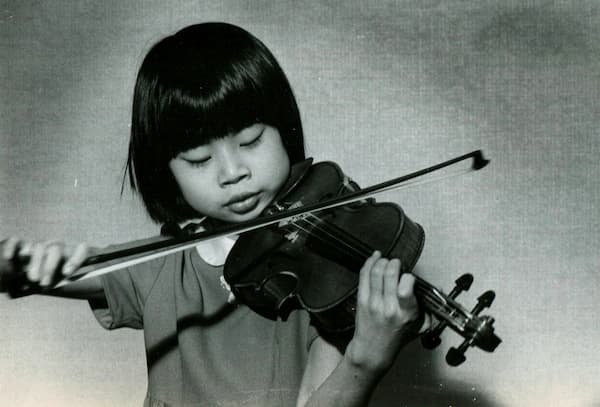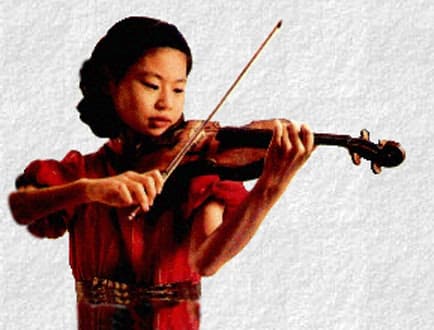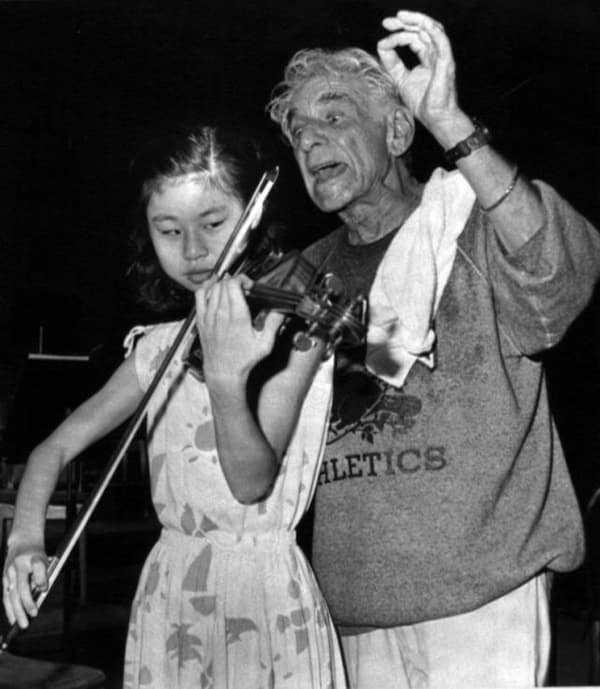Japanese-American violinist Midori has been described as a “visionary artist, activist and educator whose unique career has transcended traditional boundaries through her relentless drive to explore and build connections between music and the human experience.” An astounding child prodigy who made her debut with Zubin Mehta and the New York Philharmonic at age 11, Midori is deeply committed to furthering humanitarian and education goals. She has founded several non-profit organisations, and in recognition of her work as an artist and humanitarian, she serves as a United Nations Messenger of Peace.
Midori Performs Sarasate’s Zapateado, Op. 23, No. 2
Osaka

Midori © K. Miura
Midori Goto was born in Osaka on 25 October 1971. Her father was a successful engineer, and her mother, Setsu Gotō, was a professional violinist. Her mother would take Midori to orchestra rehearsals, and one day, Setsu heard the two-year-old Midori humming a Bach concerto they had been rehearsing two days earlier. Midori was eager to touch her mother’s violin, and the child received a tiny violin on her third birthday; it was time to get started with lessons.
Her progress was spectacular by any standard, and Midori gave her first public performance at the age of six, playing one of the 24 Caprices of Paganini in her native Osaka. Midori remembers, “I was a normal child. I started when I was three, but did not think of myself as special or different from others, and my mother was my first music teacher.” A recording of her first recital found a way to Dorothy DeLay, possibly the leading violin teacher in the world. She invited Midori to come to the US to perform at the prestigious Aspen Summer Music Festival.
Ludwig van Beethoven: Violin Concerto in D Major, Op. 61 (cadenzas by F. Kreisler) (Midori, violin; Lucerne Festival Strings; Daniel Dodds, cond.)
United States

The young Midori
Things would never be the same as Midori arrived in the United States. Midori arrived at Aspen with a stuffed animal under her arm. She played Bartok’s fiendishly difficult and emotionally complex Second Violin Concerto, astonishing the audience. Pinchas Zuckerman recalls, “she played like only a few people in the universe can do at any time; I’ve just witnessed a miracle.”
Midori remembers, “my mother took me to New York to take lessons from Dorothy Delay at the Juilliard School. My first memory of the new country was landing at the airport, where I found it cold because it was snowing.” They had no money, neither of them spoke English, and her mother was recently divorced. Midori wrote in her biography, “I lived with my mother, went to elementary school, and practiced the violin for five or six hours every day. Luckily, my mother was always there for me, finding the right words to lift my spirits. Her unflagging support gave me the confidence which is so essential to any of us.”
Midori Performs Bernstein’s Serenade after Plato’s Symposion
Isaac Stern

Midori
Midori met Isaac Stern in New York, going to his apartment on Central Park West to play for him for the first time at the age of 10. “I was in awe,” she remembers, “I soon felt very comfortable and continued to go to him for advice for the next decade.” As she wrote, “In Stern’s lessons, I regularly worked intensely to best shape a single phrase. We would sometimes spend over two hours on a single phrase, and he would always ask, why are you playing it this way or what do you think the composer intended here. He helped me to find my own interpretation and unique sound.”
As Midori reported in an interview, “I greatly appreciated the strength of his ideas… He didn’t stick to a rigid agenda; he wanted me to think for myself. It was quite a lot for a twelve-year-old, but he never treated me like a little girl. Still, it must have been very funny to watch such a great musician debating with a child! My will was very strong even then, and I already felt I needed complete conviction in what I was doing. However, he knew the art of persuasion, and the process he took me through helped me to understand my instincts even better.”
Pyotr Il’yich Tchaikovsky: Violin Concerto in D Major, Op. 35 (Midori Goto, violin; Berlin Philharmonic Orchestra; Claudio Abbado, cond.)
Crisis

Midori with Bernstein
Midoro makes incredible progress, basically mastering the repertoire with uncanny speed. She began concertising and quickly became a full-time professional, but the pressures started to build. When her mother started dating one of DeLay’s assistants, Midori rebelled. She quit her lessons with DeLay and attempted to take charge of her own career. However, by September 1994, she cancelled her concerts and completely withdrew from public view. As Midori recalled, “Some people blamed my mother, saying that I was experiencing psychological burdens associated with her remarriage or other matters, but the root cause lay much deeper.”
Suffering from depression, Midori was hospitalised for two months. She had been experiencing symptoms of anorexia for some time but was unfamiliar with the condition and did not know how to handle the situation. She finally received a diagnosis, telling the Toronto Globe and Mail, “I was severely anorexic.” She learned from her doctors that patients with eating disorders have to live with them for the rest of their lives. By understanding her condition, Midori overcame her prodigy status and personal crisis, enrolled at New York University to study psychology, and began what she calls her “mission of working with children.”
For more of the best in classical music, sign up for our E-Newsletter
